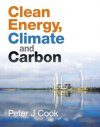![Clean Energy, Climate and Carbon Clean Energy, Climate and Carbon]()
Click to have a closer look
About this book
Contents
Customer reviews
Biography
Related titles
About this book
With the general reader in mind, Clean Energy, Climate and Carbon outlines the global challenge of decreasing greenhouse gas emissions. It covers the changing concentration of atmospheric carbon dioxide through time and its causes, before considering the promise and the limitations of a wide range of energy technologies for decreasing carbon dioxide emissions.
Despite the need to decrease carbon dioxide, the global use of fossil fuels is increasing and is likely to continue to do so for some decades to come. With this in mind, Clean Energy, Climate and Carbon looks at the range of clean energy technologies and considers in detail, what for many people is the unfamiliar clean energy technology of carbon capture and storage (CCS). How can we capture carbon dioxide from flue gases? How do we transport it? How do we store it in suitable rocks? What are suitable rocks and where do we find them? How do we know the carbon dioxide will remain trapped once it is injected underground? What does CCS cost and how do those costs compare with other technology options?
Clean Energy, Climate and Carbon also explores the political environment in which the discussion on clean energy technology options is occurring. What will a price on carbon do for technology uptake and what are the prospects of cutting our emissions by 2020 and of making even deeper cuts by 2050? What will the technology mix look like by that time?
For people who are concerned about climate change, or who want to learn more about clean energy technologies, including CCS, this is the definitive view of the opportunities and the challenges we face in decreasing emissions despite a seemingly inexorable global increase in energy demand.
Contents
Preface
Acknowledgements
1 The context
2 CO2 and climate change
3 Where and why are we producing so much CO2?
4 Technology options for decreasing CO2 emissions
5 The mitigation mix
6 Where and how can we capture CO2?
7 How can we transport CO2?
8 Storing CO2
9 How do we know CCS will be effective?
10 The cost of clean energy
11 The technology and the politics of clean energy
Acronyms
Additional general reading
References to data sources
Index
Customer Reviews
Biography
Professor Peter Cook, CBE, FTSE, is a distinguished earth scientist with an outstanding international reputation and many publications on greenhouse gas, energy and resource issues to his credit, including as a Coordinating Lead Author of the IPCC Special Volume of Carbon Dioxide Capture and Storage. He was the Director of the British Geological Survey from 1990 and 1998 and until 2011 the CEO of CO2CRC, one of the world's leading collaborative research bodies focused on greenhouse gas technologies. He is currently a consultant on energy and greenhouse issues, Senior Advisor to CO2CRC and Professorial Fellow at the University of Melbourne.



































